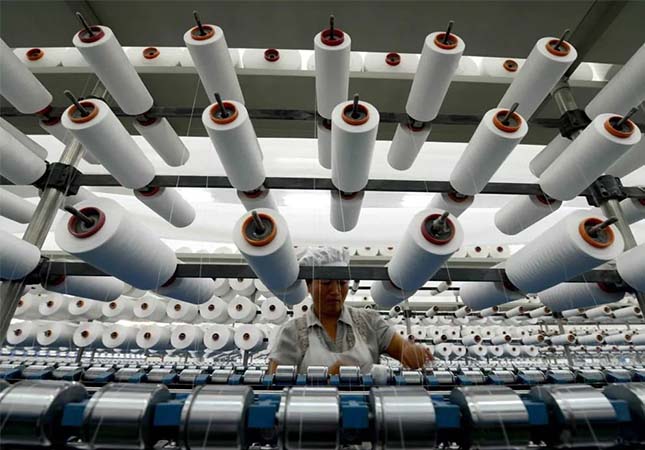From 2008 to 2022, the textile machinery industry witnessed significant advancements and developments. Technological innovations, automation, and digitalization played a crucial role in transforming the textile manufacturing process.
The textile sector in the country has experienced a remarkable resurgence in recent quarters, leading to significant benefits for the textile machinery segment, particularly those involved in the spinning and weaving industries. Between October 2009 and September 2010, textile machinery production in India witnessed an impressive year-on-year growth of 52 percent. This surge in production was primarily driven by the spinning and weaving sectors, which saw a substantial increase of 72 percent in machinery production, including allied machines.

Automation and Robotics (2008-2010): The early years of this period saw an increased focus on automation and robotics in textile manufacturing. Robots were deployed for various tasks such as fabric handling, cutting, sewing, and packaging, leading to improved efficiency and reduced labor costs.
Development Process of the Textile Machinery
l Digital Printing (2011-2013): Digital printing technology gained prominence during this period. It allowed textile manufacturers to print intricate designs and patterns directly onto fabric, eliminating the need for traditional screen printing methods. Digital printing offered greater flexibility, customization, and faster production cycles.
l Energy Efficiency and Sustainability (2012-2014): Growing environmental concerns prompted the textile machinery industry to focus on energy-efficient and sustainable solutions. Manufacturers introduced machinery with reduced energy consumption, waste reduction systems, and water recycling capabilities, thereby minimizing the environmental impact of textile production.
l Smart Textile Machinery (2014-2016): The emergence of the Internet of Things (IoT) and Industry 4.0 concepts led to the development of smart textile machinery. These machines were equipped with sensors, data analytics, and connectivity features to monitor and optimize production processes in real-time. Smart textile machinery enabled predictive maintenance, improved quality control, and enhanced overall operational efficiency.
l 3D Printing and Additive Manufacturing (2015-2017): Additive manufacturing, commonly known as 3D printing, started to make its mark in the textile industry. Textile machinery integrated with 3D printing technology enabled the production of complex textile structures and prototypes. This technology offered possibilities for customization, rapid prototyping, and reduced material waste.
l Artificial Intelligence and Machine Learning (2017-2019): Artificial intelligence (AI) and machine learning (ML) algorithms began to be incorporated into textile machinery. These technologies enabled automated defect detection, pattern recognition, and optimization of production parameters. AI and ML algorithms helped in improving quality control, reducing downtime, and increasing production effici
l Sustainable Materials and Recycling (2020-2022): The demand for sustainable textiles increased during this period, leading to the development of machinery focused on recycling and using eco-friendly materials. Textile machinery incorporated processes for recycling post-consumer waste, such as plastic bottles or textile scraps, into new yarns or fabrics. Additionally, machinery capable of processing natural fibers and plant-based materials gained traction as alternatives to synthetic fibers.
l Advances in Spinning and Weaving (2020-2022): Spinning and weaving processes also witnessed advancements. Machinery for spinning finer and stronger yarns with enhanced quality and productivity was developed. Innovations in weaving machinery allowed for the production of complex patterns, jacquard fabrics, and 3D structures with improved efficiency.
During this period, the spinning sector played a pivotal role, accounting for a significant share of the overall volume of textile machinery produced in the country, with a 66.2 percent contribution. This highlights the sector's substantial growth and importance within the textile machinery industry.
Moreover, following the economic crisis, the vibrant domestic economy played a crucial role in driving the demand for textiles. Despite the rise in raw material costs, such as cotton and polyester, many industry players successfully managed to pass on the burden of price increases to the end users. This resilience demonstrates the sector's ability to adapt to challenging market conditions while maintaining profitability.
Additionally, the Technology Upgradation Fund Scheme (TUFS), introduced by the central government, has proven to be a valuable resource for the textile manufacturing industry. Numerous textile firms have chosen to upgrade their machinery and facilities to leverage the benefits offered by the scheme. As of June 2010, approximately Rs 2.82 billion had been distributed under the scheme for fiscal year 2011, further supporting the growth and modernization of the sector.
Overall, the textile sector's revival, coupled with the growth in textile machinery production, underscores the positive trajectory of the industry. The continued demand for textiles, despite the challenges of rising raw material costs, and the support provided by government initiatives like TUFS, bode well for the future of the textile machinery segment and the overall textile manufacturing industry in the country.
Throughout this period, the textile machinery industry focused on integrating automation, digitalization, and sustainable practices to improve productivity, quality, and environmental impact. These developments revolutionized the textile manufacturing process, making it more efficient, flexible, and environmentally friendly.
SUNTECH Textile Machinery offers a comprehensive range of products that cater to various fabric types. Our product lineup includes, but is not limited to, pinking machine, loom machine, weaving machine, beam truck, fabric cutting machine, motorized beam trolley, beam storage, and fabric inspection machine. With our innovative approach and extensive experience, SUNTECH Textile Machinery remains at the forefront of the textile industry. We warmly welcome requests for quotes and cooperation opportunities from you!




